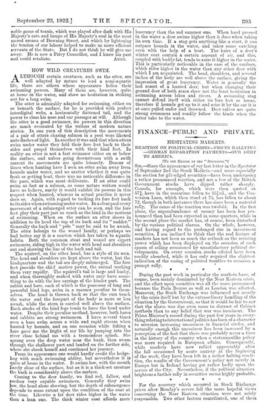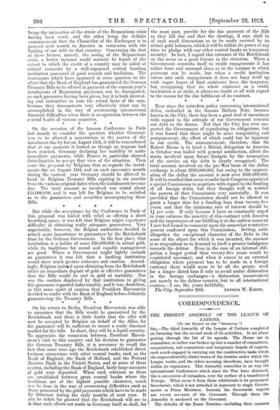FINANCE—PUBLIC AND PRIVATE.
HESITATING MARKETS.
REACTION ON POLITICAL CRISES—PRICES RALLYING —GERMAN REPARATION PAYMENTS—OUR DEBT TO AMERICA.
[To THE EDITOR OF THE "SPECTATOR."] Sia,—Since the appearance of my last letter in the Spectator of September 2nd the Stock Markets—and more especially the section for gilt-edged securities—have been undergoing a rather pronounced reaction, and not a few of the British Government stocks have dipped rather sharply. Consols, for example, which were then quoted at 57f, have in the meantime fallen to 55ixd., and the Con- version Loan, which then stood at 75, has fallen to about 72, though in both instances there has since been a material rally. The cause of the reaction was twofold. In the first place, the superabundance of money has been less pro- nounced than had been expected in some quarters, while in the second place the market has, of course, been disturbed by the various political alarms. On the whole, however, and having regard to the prolonged rise in investment securities, I am inclined to think that the real feature of markets has not been so much the setback as the resisting power which has been displayed on the occasion of each spasm of selling occasioned by unsatisfactory political de- velopments. On every occasion stocks offered have been readily absorbed, while it has only required the slightest indication of the easing of political troubles to occasion a prompt rally.
During the past week in particular the markets have, of course, been mainly dominated by the Near Eastern crisis, and the effect upon securities was all the more pronounced because the Paris Bourse as well as London was affected. Moreover, the Stock Exchange was influenced not merely by the crisis itself but by the extraordinary handling of the situation by the Government, so that it would be fair to say that the alarm was due even more to distrust of Cabinet methods than to any belief that war was imminent. The Prime Minister's record during the past few years in every- thing relatingto international politics has been of a character to occasion increasing uneasiness in financial circles, and naturally enough this uneasiness has been increased by a perception of the fact that there was probably never a time in the history of the country when a statesmanlike policy was more required in European affairs. Consequently, while markets have now rallied appreciably after the fall occasioned by acute anxiety at the beginning of the week, they have been left in a rather halting condi- tion, the results of the Government's policy not merely in Europe but in Ireland having got rather badly upon the nerves of the City. Nevertheless, if the political situation brightens a further rally in securities seems highly probable.
For the recovery which occurred in Stock Exchange prices after Monday's severe fall the more hopeful views concerning the Near Eastern situation were not solely responsible. Two other factors contributed, one of them being the intimation of the strain of the Reparations crisis having been eased, and the other being the definite announcement that the Chancellor of the Exchequer is to proceed next month to America in connexion with the funding of our debt to that country. Concerning the first of these factors, namely, the easing of the Reparations crisis, a better instance could scarcely be found of the extent to which the credit of a country may be aided at critical moments by a well-organized central banking institution possessed of good records and traditions. The statements which have appeared in some quarters to the effect that the Bank of England has guaranteed the German Treasury. Bills to be offered in payment of the current year's instalments of Reparation payments can be disregarded, no such guarantee having been given, but it is both interest- ing and instructive to note the actual facts of the case, because they demonstrate very effectively what can be accomplished in the way of overcoming international financial difficulties when there is co-operation between the central banks of various countries.
* • On the occasion of the famous Conference in Paris last month to consider the question whether Germany was to be allowed a moratorium in the matter of the instalment due by her on August 15th, it will be remembered that at one moment it looked as though an impasse had been reached, Germany declaring her inability to make immediate payments, while France in particular showed disinclination to accept that view of the situation. Then came the proposal by Belgium that as regards the instal- ments due on August 15th and on each successive month during the current year Germany should be allowed to hand to Belgium Treasury Bills expiring in six months from the various original dates when the instalments become due. The total amount so involved was round about £14,000,000, and it was left for Belgium to be satisfied as to the guarantees and securities accompanying these Bills.
'* But while the acceptance by the Conference in Paris of this proposal was hailed with relief as offering a short breathing space, it was felt that Belgium might experience difficulty in obtaining really adequate guarantees. Very sagaciously, however, the Belgian authorities decided to attach more importance to guarantees by the Reichsbank than by the German Government. In the first place, that institution is a holder of some £50,000,000 in actual gold, while its traditions for sound and capable management are good. Where a Government might lightly embark on guarantees it was felt that a banking institution would show much greater reticence and caution. Accord- ingly, Belgium insisted upon obtaining from the Reichsbank either an immediate deposit of gold or effective guarantees that the Bills would be met in gold at maturity. Nor was the caution displayed by that institution in giving this guarantee regarded unfavourably, and it was, doubtless, in this same spirit of caution that President Havenstein decided to confer with the Bank of England before definitely guaranteeing the Treasury Bills.
On his return to Berlin, President Havenstein was able to announce that the Bills would be guaranteed by the Reichsbank, and there is little doubt that the offer will now be accepted by Belgium on behalf of the Allies, for the guarantee will be sufficient to ensure a ready discount market for the bills. In short, they will be a liquid security. To appreciate the connexion between President Haven- stein's visit to this country and his decision to guarantee the German Treasury Bills, it is necessary to recall the fact that some time ago the Reichsbank established direct business connexions with other central banks, such as the Bank of England, the Bank of Holland, and the Federal Reserve Bank in the United States, and at some of these centres, including the Bank of England, fairly large amounts of gold were deposited. When such relations as these are established between great central banks where the traditions are of the highest possible character, much can be done in the way of overcoming difficulties such as those presented by the gold payments which have to be made by Germany during the early months of next year. It can be taken for granted that the Reichsbank will see to it that such efforts are made in Germany itself as shall, for the most part, provide for the due payment of the Bills as they fall due and that the shortage, if any, shall be of such small dimensions as to be easily covered by its actual gold balances, which it will be within its power at any time to pledge with any other central banks as temporary security. In fact, I regard this entrance of the Reichsbank on the scene as a good feature in the situation. When a Government commits itself to credit engagements it has rather loose and unsound ideas as to the manner in which payment can be made, but when a credit institution enters into such engagements it sloes not buoy itself up with vague hopes of final assistance from the taxpayer, but, recognizing that its whole existence as a credit institution is at stake, it allows no doubt at all with regard to the means for the due fulfilment of its contract.
Ever since the mistaken policy concerning international debts, embodied in the famous Balfour Note, became known in the City, there has been a good deal of uneasiness with regard to the attitude of our Government towards our debt to the States. Not that the City has ever sus- pected the Government of repudiating its obligations, but it was feared that there might be some temporizing and postponement, the effect of which could but be injurious to our credit. The announcement, therefore, that Sir Robert Horne is to head a British delegation to America in October was hailed with general satisfaction, albeit the strain involved upon future Budgets by the resumption of the service on the debt is clearly recognized. The total amount involved on the pre-War basis of the dollar exchange is about /850,000,000, but owing to the appreci- ation of the dollar the amount is now over £900,000,000. It will be recalled that some months back Congress appointed a special Commission to negotiate with regard to the funding of all foreign debts, but they thought well to restrict the powers of that Commission very materially. It was provided that the Commission should not be allowed to grant a longer date for a funding loan than twenty-five years, and that the minimuin rate of interest should be 4i per cent. If only because I have so constantly urged in your columns the sanctity of this contract with America and the importance of our fulfilling it at the earliest moment I now feel bound to comment upon the somewhat restrictive powers conferred upon this Commission. Setting aside altogether the exceptional character of the Debt in the sense of the object for which it was incurred, the amount is so stupendous as to demand in itself a greater indulgence towards the debtor. Even in the case of an internal obli- gation a longer period than twenty-five years would be considered necessary, and when it comes to an external obligation where payment has to be made in a foreign currency there would seem to be all the greater need for a longer dated loan if only to avoid undue dislocation in the foreign exchanges—a dislocation inconvenient not merely to the debtor country, but to all international centres.—I am, Sir, yours faithfully,



































 Previous page
Previous page